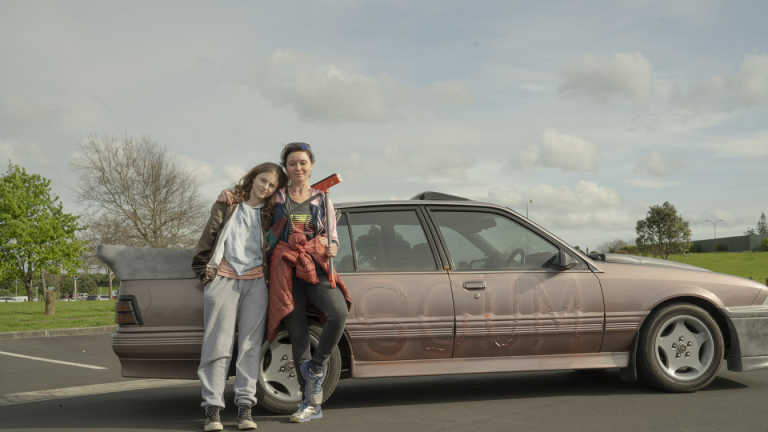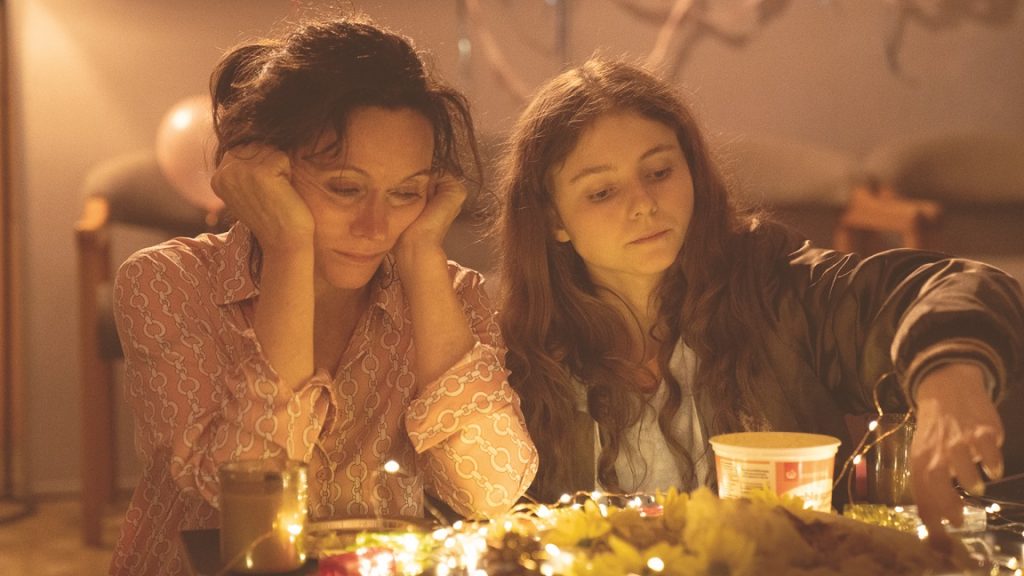
Among the many great films premiering at this year’s Tribeca Film Festival is The Justice of Bunny King, the feature film debut from New Zealand director Gaysorn Thavat. Essie Davis (The Babadook) stars Bunny King, as a woman fighting desperately to get her children back from foster care who also looks out for her niece (Thomasin McKenzie), whose housing situation seems far more problematic than what Bunny might offer her own children.
Davis’ performance is the heart of this film, tapping into a resilience – and a sense of humor – that indicates her commitment to providing for her family, even if the government tells her she’s not fit to do so. I spoke with Davis and discovered her passion for this material and for broadcasting the stories of so many to the world with this important, affecting film.
Q: What attracted you to this role?
ED: She’s just so hopeful. She’s so positive. She’s a real fighter, and I think no matter how awful her past situation has been, she’s got such a positive attitude to life, and to what she can achieve in spite of everything that holds her back. I think it’s a really important story to tell, because it’s been untold forever.
The amount of women who are struggling on the poverty line, the victims and the survivors of domestic violence, and the hoops that current Western society makes them jump through to prove that they’re worthy.
Q: What kind of research did you do to prepare for this role?
ED: I spent a lot of time with a lot of women in New Zealand and spoke to them. It was just amazing. Nearly every extra who was in the film would say, this is my story, this is what happened to me. I’m so glad you’re telling my story. When we’re sitting in the department of family services in the film, the amount of women who are in there who were just saying, this is exactly what I’ve gone through, this is my life, it’s so important. Thank you for telling this story.
Q: Bunny takes some troubling action to try to remain with her family. Do you believe everything she does is justified?
ED: I think that she makes a lot of bad mistakes, but I can completely empathize with all of the choices that she makes. I can understand how frustrating it would be to have essentially saved the life of your child only to be considered dangerous. That’s just a contradiction in itself. Yeah, I do think she’s totally justified. She gets put into a situation and she’s not going to quit because she doesn’t want to break a promise to her children. If she’s given the opportunity to start a life in a garage and have the stability to bring up her children, she can’t stand by and let her brother-in-law be a pedophile. I certainly, from my character’s point of view, feel that everything is justified. It just turned out stuffed up.
Q: You’ve played some memorable mothers in films like The Babadook and Babyteeth. How do you see those roles as being different from this one?
ED: She’s so different. She’s a real fighter. She’s a never give up girl. And she knows how to make do. She’s incredibly capable and she’s actually got more hope and more capability and common sense than either of those other two mothers. All those mothers love their children, but Bunny has to fight for hers. I mean, I guess they all have to fight for their children, but Bunny is quite practical and kind and generous.
Q: There is some humor in this otherwise very serious film. How did you balance those moments?
ED: Oh, I think the whole film is meant to be full of humor. Bunny’s got such a positive attitude to life, and to the flip side of a shitty situation. There was a point in the pass of the script where all of the humor was sucked out of it, and it was like, no! We’re talking about hope, and giving energy and positivity to a really shit situation that thousands, hundreds of thousands, millions of women find themselves in. I don’t recommend going to the lengths that Bunny goes to when she gets cornered, but there’s only so many months, years, that you can bang on a glass window or stand in a queue waiting for someone to actually help when you’ve done everything that they’ve asked you to do.
Q: One of your costars is the very talented Thomasin McKenzie. Had you seen her work before this, and what can you say about her?
ED: I love Thomasin. I met her on True History of the Kelly Gang, which we shot with my husband. That was the first time I had seen her, I saw her audition for that. She stood out because she was not trying to fit in. She’s very simple and eloquent in her presence. We had a lot of fun, I have to say, particularly having our little head-thrashing bash singing to the music in our car journey. She’s a really lovely actress, and it was a pleasure working with her.

Q: You’re also working with a first-time director, Gaysorn Thavat. What guidance did you receive from her, and what was her vision?
ED: Gaysorn has a great vision, she’s very eloquent and she fought really hard, as I did with her, to keep this in both the humorous and brutal worlds that we both saw, as opposed to high comedy or darkest drama, which are also great but different styles of Kiwi film. She was very insightful and highly researched, and we just held each other’s hand and fought together to do what we wanted to do. I really loved working with her.
Q: You’re from Australia, starring in a film from New Zealand that’s premiering in the United States. Do you think that there is a universality to the story portrayed in this film?
ED: I think it’s a universal story, particularly in Western society. I think that particularly at this time it’s just getting worse. The poor keep getting poorer. The rich keep getting richer. Domestic violence is having a spotlight shone upon it. It’s not okay. Men and boys have to learn how to relate to women in respectful and kind ways, and our governments need to support women much more than they are. It’s ludicrous that there isn’t more support for women in dangerous relationships or children and mothers to be supported together. There’s a housing crisis certainly in Australia and New Zealand. I don’t know what it’s like in the States, but I imagine that being poor and having to tick boxes for the government must be extremely frustrating and unfair.
Q: This film reminded me in a good way of Herself. Have you seen it?
ED: I haven’t. It’s on my to-watch list! I’m looking forward to that.
Q: You’re not in New York now, but you’re in Toronto shooting another project. Can you tell me about it?
ED: No, I can’t. I’ll have to kill you. I’ve actually just arrived. I’m in quarantine, but it’s very exciting.
Q: Do you have colleagues in New York and have you heard how the film was received?
ED: No, I haven’t. Have you? Someone pinged me a review and it was quite positive.
Did you enjoy it?
Q: I’m not sure enjoy is the right word but yes, it was very good.
ED: But did you have a laugh and a tear?
Q: Something like that – I think that’s a good way of putting it. Thank you for talking to me today, and I wish you plenty of luck with this film and whatever secret project you’re working on now.
ED: I would tell you, I’m just not allowed.
Q: I hope we get to speak about whatever it is someday.
ED: Thanks so much, Abe.
Here’s the trailer for the film:
The Justice of Bunny King is screening in the Viewpoints section of the Tribeca Film Festival.

